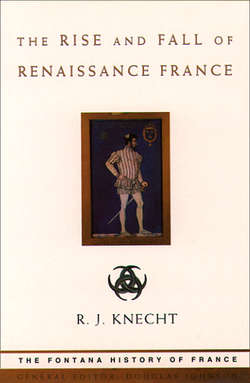Читать книгу The Rise and Fall of Renaissance France - R. Knecht J. - Страница 54
The beginnings of heresy
ОглавлениеHeresy was not unknown in France at the close of the Middle Ages, but except in parts of the south which had been infiltrated by Waldensianism (see below p. 221), it was not an organized movement. Thus Erasmus was broadly correct when he described France in 1517 as the only part of Christendom that was free of heresy. But this happy state was short-lived. In 1519, only two years after Martin Luther had posted up his ninety-five theses in Wittenberg, Lutheranism first appeared in Paris. John Froben, the Basle printer, reported on 14 February that he had sent 600 copies of Luther’s works to France and Spain. They were being avidly read, even by members of the Paris Faculty of Theology. In July 1519, Luther and Eck held their famous debate in Leipzig, and soon afterwards they agreed to submit their propositions to the judgement of the universities of Erfurt and Paris. While the Paris theologians were pondering the matter, Luther gave them further food for thought by publishing three radical tracts. On 15 April 1521 the faculty published its Determinatio condemning 104 Lutheran propositions. On 13 June the faculty and the parlement assumed joint control of the book trade in and around Paris. It became an offence to print or sell any religious book without the faculty’s prior approval. On 3 August a proclamation was read out in the streets to the sound of trumpets, calling on all owners of Lutheran books to hand them over to the parlement within a week on pain of imprisonment and a fine.
Whatever his private beliefs may have been, Francis I repeatedly expressed his opposition to heresy, sharing the view, almost universally held in his day, that religious toleration undermined national unity. The oath he had taken at his coronation bound him not only to defend the faith, but to extirpate heresy from the kingdom. However, at this early stage of the Protestant Reformation heresy was not easily recognized; the boundary between Christian humanism, as expressed in the works of Erasmus or Lefèvre, and Lutheranism was far from clear. Nor was the king obliged to endorse any definition of heresy, not even that of the Faculty of Theology. Having already committed himself to the cause of humanism, Francis must have found it difficult to accept Béda’s view that ‘Luther’s errors have entered this [kingdom] more through the works of Erasmus and Lefèvre than any others.’ The king was also much influenced by his sister Marguerite, a deeply devout person, who corresponded with Guillaume Briçonnet, bishop of Meaux, from June 1521 until October 1524, and through his teaching imbibed the ideas of Lefèvre.
Sooner or later trouble was likely to break out between the king and the faculty. While Francis was ready to suppress Lutheranism, he was unwilling to silence the voice of Christian humanism. The first sign of conflict occurred in November 1522, when Guillaume Petit, the king’s confessor, complained to the faculty about the sermons of Michel d’Arande, an Augustinian hermit who had become Marguerite’s almoner. By 1523 the Faculty of Theology and the parlement were seriously worried about the growth of heresy. Lutheran books were being reported from many parts of the kingdom, and evangelical preachers were increasingly active. In June 1523 the faculty was told of scandals provoked by the publication of Lefèvre’s Commentarii initiatorii in IV Evangelia, but it decided not to examine the work after a warning received from Chancellor Duprat. In July it summoned Mazurier and Caroli, two members of the Cercle de Meaux, to answer a complaint arising from their sermons. This marked a change of policy by the faculty: hitherto it had been content to judge doctrine; now it was encroaching on episcopal jurisdiction. The faculty’s action was, in effect, an attack on the entire Cercle de Meaux. In August, prompted by the publication of Lefèvre’s edition of the New Testament, Béda forced through the faculty a condemnation of all editions of Scripture in Greek, Hebrew and French, causing Francis to intervene again. In April 1524 he forbade any discussion of Lefèvre’s work, alleging that he was a scholar of international renown. In October he nipped in the bud a move by the faculty to condemn Erasmus.
By 1523 heresy was so firmly entrenched in France that the Faculty of Theology and the parlement decided that censoring books was not enough: it was time to make an example of the heretics themselves. On 13 May the home of Louis de Berquin, a young nobleman-scholar, was searched by the parlement’s officials. On his shelves they found books by Luther and other reformers as well as Berquin’s own writings. These the faculty was asked to scrutinize, but the king, after giving his consent, changed his mind: he appointed a special commission, headed by Duprat, to carry out the examination. But the faculty, having already examined Berquin’s books, condemned them, and on 1 August he was imprisoned by the parlement. Four days later he was sent for trial on a heresy charge by the bishop of Paris, but Francis evoked the case to the Grand conseil. Meanwhile, Berquin was set free by royal command and allowed to go home. His books, however, were burnt outside Notre-Dame.
